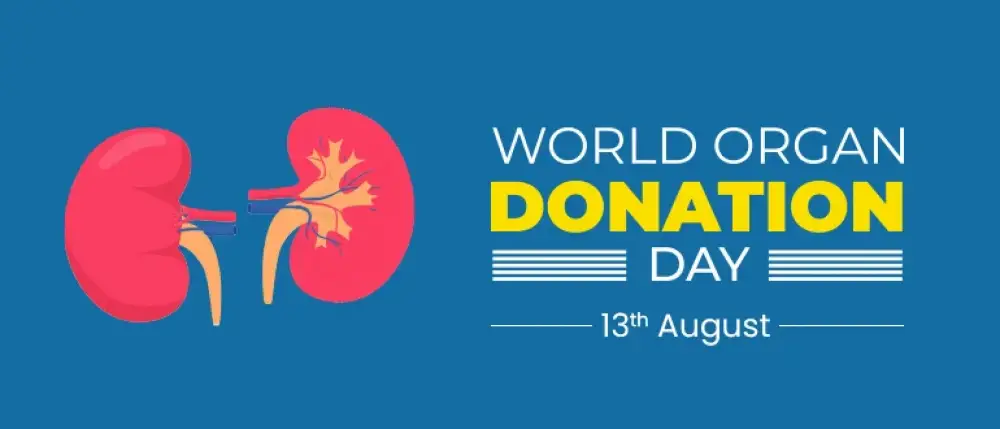Subscribe to get weekly insights
Always stay up to date with our newest articles sent direct to your inbox
Published on 5 Aug, 2024
Updated on 12 Aug, 2025
4351 Views
5 min Read

Written by Jyotsana Shekhawat
Reviewed by Akhil Pillai
favorite3Likes
Every 10 minutes, one person is added to the organ transplant waitlist in India. 20 people die every day waiting for an organ. There is a significant gap between demand and supply. India witnesses 17,000 to 18,000 solid organ transplants annually, a number exceeded only by the US and China. However, the gap persists and calls for more organ donation awareness. More than 3 lakh patients are waiting for organ donations, while the number of donors is only a few thousand. Moreover, organ donation has shown only slow growth over the years. World Organ Donation Day, observed globally on 13th August, is a stark reminder for all of us to reflect on this serious numbers and do our part to make a positive change.
World Organ Donation Day is an important global event that commemorates the first-ever living donor organ transplant done in 1954 in the USA. This day is observed every year to raise awareness about organ donation and encourage more people to donate. Note, many countries observe this day as per their history of organ donation.
In India, the first successful deceased organ donation occurred on 3rd August 1994. Hence, Organ Donation Day in India has been observed on 3rd August starting from 2023. Before 2023, National Organ Donation Day was celebrated on 27th November, starting in 2010. The National Organ and Tissue Transplant Organisation (NOTTO) designated July as Organ Donation Month to commemorate the implementation of the Transplantation of Human Organ Act on 8th July 1994.
The World Organ Donation Day 2025 theme, "Answering the Call”, emphasises the urgent need for more donors and the moral courage that it takes to say yes to giving life to someone. This theme surpasses age, background, religion, and societal taboo. It invites us all to reflect on our ability to make a positive impact that lasts a lifetime.
From registered doctors to those new to exploring this idea, the theme of World Organ Donation Day 2025 provokes a thought amongst everyone. This is not just about thinking, it is also about acting now. Now is the time to decide how we can initiate a good change.
The main idea of observing World Organ Donation Day is to nudge people to pledge to donate organs after death. While it is a serious decision, and perhaps even complex, the impact of this action is profound and far-reaching. It can set a wonderful example of humanity. Here are the reasons why organ donation is one of the best decisions one can make:
Organ donation isn’t limited to one form. Understanding the different types can help individuals make more informed choices:
When a living person donates an organ or a part of the organ, it is called a living donation. The most common examples of living donations are kidney donation, liver donation, blood donation, etc. A person can donate an organ only if he is medically fit, and his blood type and tissue match the person who needs a transplant.
When a person’s organs are donated after his death, it is called cadaver or diseased donation. In such cases, the organs should be removed as soon as possible. A person who is willing to donate organs after his death needs to register for organ donation. How a donor dies is also an important factor in deciding which organs can be donated.
While you are on your way to inspire the action for change, here are the important things to keep in mind as you pledge to donate organ/s:
Any healthy individual irrespective of age, gender and religion can become an organ donor. It is a noble act and everyone should pledge their organs. You can fill an online pledge form by Organ India to register as a donor. Once registered, NOTTO issues a donor card with a unique registration number. Remember in India, family consent is also important for organ donation.
World Organ Donation Day is a special day to honor organ donors whose selfless acts have saved many lives. Moreover, individuals in need of an organ transplant should be aware that donor expenses are covered under health insurance coverage. Care Health Insurance offers coverage for organ donors, subject to specific terms and conditions. If you want to know more about the various insurance plans that cover organ donor expenses, contact our team for more information.
>> Also Read:
Disclaimer: The above information is for reference purposes only. Kindly consult your general physician for verified medical advice. The health insurance benefits are subject to policy terms and conditions. Refer to your policy documents for more information.
Thyroid : मामूली नहीं हैं महिलाओं में थायराइड होना, जानें इसके लक्षण और घरेलू उपचार Vipul Tiwary in Diseases
शुगर कंट्रोल कैसे करे? जानें, डायबिटीज में क्या खाना चाहिए Vipul Tiwary in Health & Wellness
हाई ब्लड प्रेशर को तुरंत कंट्रोल कैसे करें? देखें इसके उपाय Vipul Tiwary in Diseases
पैरों में दर्द किस कमी से होता है? जानें, इसके घरेलू इलाज Vipul Tiwary in Health Insurance Articles
National Newborn Care Week: Every Touch, Everytime, Every Baby! Mudit Handa in Awareness Days
Pancreatic Cancer Awareness Month: Shine a Light for Early Detection! Mudit Handa in Awareness Days
Lung Cancer Awareness Month: Breaking Barriers to Champion the Cause Mudit Handa in Awareness Days
World Immunization Day: Attaining Physical and Financial Immunity Mudit Handa in Awareness Days
Always stay up to date with our newest articles sent direct to your inbox
Loading...